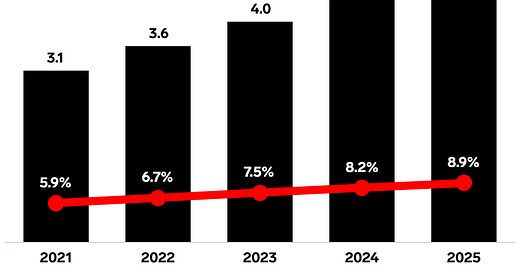Hi Fintech Futurists,
Welcome back to our podcast series! For those that want to subscribe in your app of choice, you can find us at Apple, Spotify, or on RSS.
In this conversation, we chat with Simon Taylor, the head of strategy and content at Sardine.ai, which is a modern compliance infrastructure. Before this, Simon served as the Co-Founder and Blockchain Practice Lead at 11:FS. Simon has been immersed in the technology of financial services for as long as he’s been working and is consistently voted one of the most influential people in Banking, Insurance and Fintech by banks, his peers and a number of industry bodies.
Simon Led Blockchain Research and Development at Barclays, where Barclays became the first bank in the world to perform a live trade finance transaction over a Blockchain / DLT with a real customer attached. Today Simon advises Governments, Regulators and some of the worlds largest Banks, Financial Institutions and Corporations on how Blockchain and DLT will impact their business in the short, medium and long term. Prior to this Simon helped build the Barclays www.thinkrise.com programme and held a number of roles in payments, banking and the telco sector.
In addition Simon is a co-host of both Fintech Insider the #1 Business Podcast in Europe and Blockchain - the fastest growing business podcast and the home of Blockchain knowledge and first rate interviews.
Timestamp
2’21”: The start of Simon’s career
7’10”: Brief intro to Sardine (a leading payments, fraud, and compliance platform)
10’07”: The connection between payments, banking and commerce
16’13”: The initiation and sustained relationship between a bank and an acquirer
20’10”: The role of acquiring merchants and differences between gateways and processors
26’04”: Revolut Business launching an acquiring solution across Europe and what that means for the industry as a whole
32’31”: The relationship between business banking and acquiring businesses
34’21”: Methods to connect with Simon
Sneak Peek:
Simon Taylor:
Revolut is a blitz scaler. If you look at what they've done, they've gone into as many markets as possible, as quickly as possible. They've thrown as many features at consumers as they could, as quickly as possible. And some of them have stuck. Some of them haven't. And it's enabled them to scale, but it's also meant some experiments failed. And, if you then look at their business side of the house, business customers are potentially quite a little bit more attractive than consumers. They tend to have higher deposits. They have higher expenses. Getting 1% or even 0.5% interchange on a monthly spend of $1,000 is nice. Getting that on a monthly spend of $10,000, $100,000 is much nicer. So, if you can get that customer, each customer is a lot more valuable than the consumers. There's arguably less of them, but they can become very valuable. So, your effort impact kind of goes up, especially if your distribution is near as low cost as it is on the consumer side.The step into business made sense. And then doing that, they claim to have about half a million business customers. That is not an insignificant amount of businesses to have, using the cards and using the product. And so, it's natural then you would look to extend the product lines into those businesses. You've got a beach head. You've got them using a few products. That's great. But, a lot of these businesses, you…
To read the full transcript, subscribe below:
Postscript.
Subscribe to our podcast on Apple Podcasts or Spotify
What did we miss? Reach out here anytime.
Stop by our Discord!
Like it? Share it!














